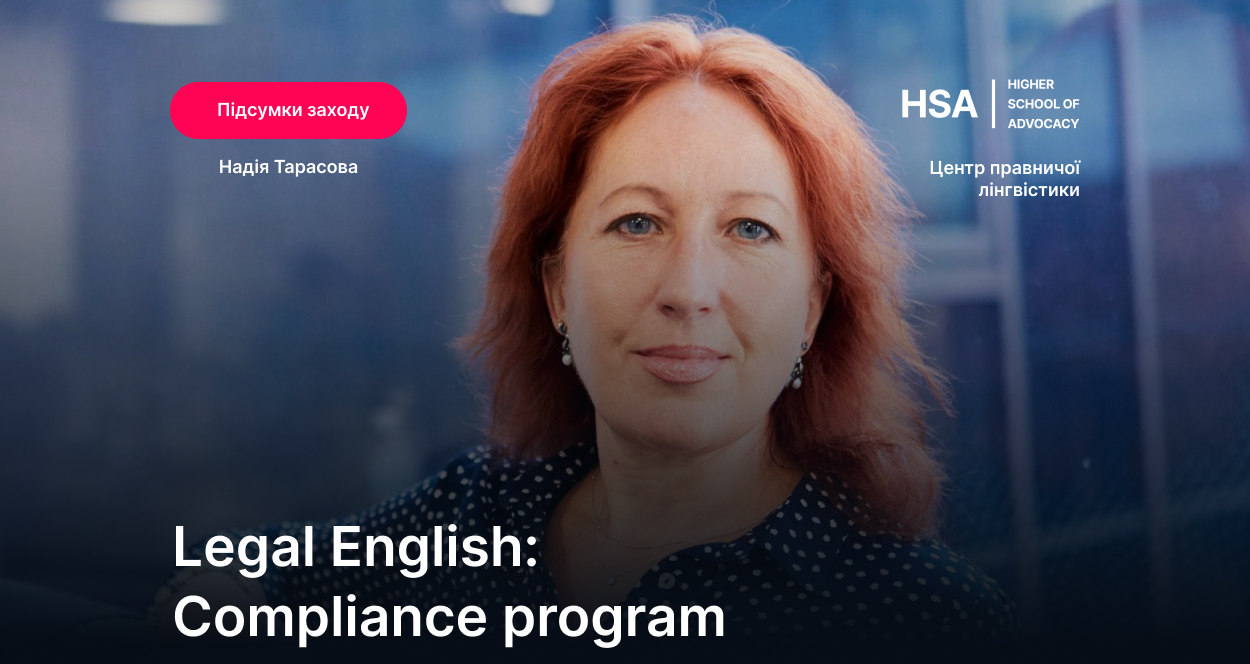
Лектор докладно проаналізувала разом з учасниками юридичну англійську, а саме:
- 1. Vocabulary.
- 2. Compliance as a tool to protect the owner’s assets.
- 3. Overview OF International and Ukrainian standards and structures.
- 4. Key compliance risks.
- 5. Elements of Effective Compliance Program.
У рамках характеристики юридичної англійської акцентовано на наступному:
1. Vocabulary
- Комплаєнс (compliance – відповідність; походить від дієслова to comply – відповідати) – буквально означає Дотримання – дія відповідно до запиту або вказівки; підкорення (compliance is an action in accordance with request or command, obedience).
- Антикорупційний комплаєнс – здатність дотримання встановлених антикорупційних вимог, обмежень та заборон.
- Anticorruption compliance – ability to comply with the established anti-corruption requirements, restrictions and prohibitions.
- Prevention of corruption violations – запобігання корупційним порушенням.
- Implementation of a culture of good behaviour – Впровадження культури належної поведінки.
- Compliance risk mitigation – мінімізація (пом’якшення) комплаєнс-ризиків.
- Corporate values – корпоративні цінності.
- Due diligence – actions taken to satisfy a legal requirement, especially when buying or selling something or employing someone.
- Regulatory sanctions (penalties) – регуляторні санкції.
- Charitable (donation)- helping people by giving money, food, housing, etc. because they are in need.
- Entertainment – розвага, дозвілля.
- Mergers and acquisitions (M&A) – the field of (commercial or company) law that deals with companies purchasing interests in other companies and combining with each other.
- AML (anti-) money laundering – the crime of hiding, disguising or moving money made from crimes to make it seem that the money has been earned or received legally.
- Whistleblower (викривач) – a worker who reports some form of wrongdoing in the workplace to an authority or other organisation. In many jurisdictions, whistle-blowers are protected by law and cannot be victimized by their employer.
2. Compliance as a tool to protect the owner’s assets
Compliance is a system of procedures and actions aimed at reducing the risks of non-compliance with the law and the company’s internal documents and corporate ethics.
Комплаєнс – це система процедур і дій, спрямованих на зниження ризиків невідповідності законодавству та внутрішнім документам компанії, корпоративній етиці.
2014. I supported the signing of a contract with a Nepalese telecommunications operator. All terms of the contract are agreed upon. The signing is scheduled for the next day. And then the counterparty says that we need to sign a small Annex. This “little annex” was an anti-corruption program that we had to not only sign, but also guarantee its implementation in our own group of companies. In addition, we were obliged to provide our compliance program (anti-corruption) to the counterparty for review. The compliance program was developed overnight). An anti-corruption clause was implemented in this Program for the contract(s).
3. Overview OF International and Ukrainian standards and structures
- OECD Anti-Bribery Convention (1997);
- United Nations Convention against Corruption (“UNCAC”);
- Other Anti-Corruption Conventions;
- U.S. Foreign Corrupt Practices Act (“FCPA”) (1977);
- UK Bribery Act (“UK Bribery Act”) (2010);
- France’s anti-corruption law (“Sapin II”) (2016);
- Закон України «Про запобігання корупції»;
- Закон України «Про засади державної антикорупційної політики на 2021-2025 роки» (антикорупційна стратегія);
- Закон України «Про Національне антикорупційне бюро України».
“Закон Сполученого Королівства про боротьбу з хабарництвом” (UKBA) UKBA поширюється на:
- юридичних осіб, зареєстрованих у Великій Британії, які здійснюють свою діяльність на території країни та за її межами,
- компанії, які не зареєстровані у Великій Британії, але діють на її території,
- відповідальність накладається не тільки на хабародавця, а й на компанію, інтереси якої представляє хабародавець,
- тобто закон поширюється на будь-яких суб’єктів, які мають будь-яке відношення до компанії, включаючи асоційованих осіб.
“Foreign Corrupt Practices Act Of 1977 (FCPA) – Us Federal Law Bribery Of Public Officials (Government Employees) Дія FCPA розповсюджується на:
- американські компанії, чиї акції котируються на американських біржах, або компанії, які зобов’язані подавати звітність до Комісії США з цінних паперів (Securities and Exchange Commission);
- бізнес організації незалежно від форми власності (партнерства, корпорації, компанії з обмеженою відповідальністю, приватні підприємства), які створені відповідно до законодавства США або здійснюють свою діяльність на території США;
- фізичних осіб, які визнаються посадовими особами, працівниками, представниками зазначених вище бізнесорганізацій, а також фізичних осіб, які є резидентами США;
- неамериканські компанії, якщо їхні акції котируються на американській біржі або вони діють від імені американської компанії у зв’язку із вчиненням корупційного діяння.
4. Key compliance risks:
- Conflicts of Interest;
- Sanctions;
- Changes in regulatory requirements;
- Failure to comply with laws & regulations;
- Information Protection;
- AML;
- Fraud risks;
- Competition Anti-Trust (Monopoly risk).
5. Elements of Effective Compliance Program
The “Seven Elements of an Effective Compliance Program” (Seven Elements) from the U.S. Federal Sentencing Guidelines Manual, is widely recognized as THE reference point against which a company measures its existing compliance program or a new company should use as the baseline to build its compliance program. Each element co18vers a different aspect of the compliance program, from setting up a program to evaluating it for effectiveness. The Seven Elements provide guidance to help a company enforce internal controls and mitigate risks related to compliance.
The Seven Elements are:
- Implementing written policies and procedures;
- Designating resources, including a compliance officer and compliance committee;
- Conducting effective training and education;
- Developing effective delegations of authority and due dilligence;
- Conducting internal monitoring and auditing;
- Enforcing standards through well-publicized disciplinary guidelines;
- Responding promptly to detected problems and undertaking corrective action.
Першоджерело - https://tinyurl.com/bdezuc3y